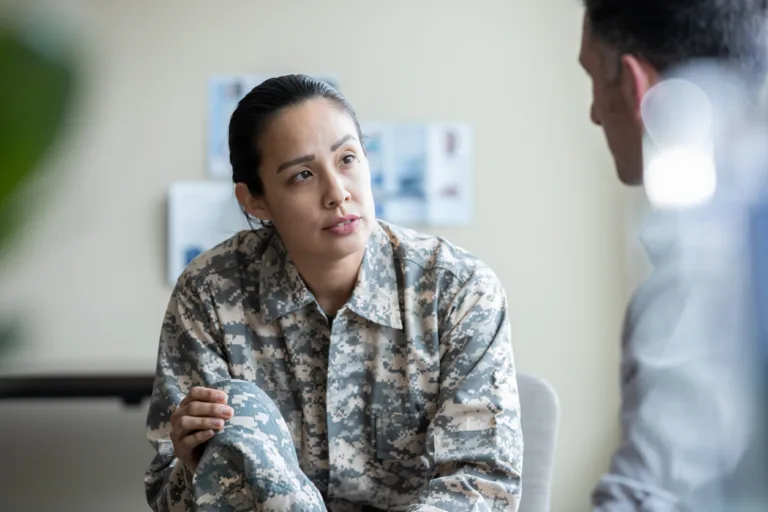In the early days of retired Maj. Trisha Stavinoha’s U.S. Army career, she discovered she had a gastrointestinal (GI) issue that made it nearly impossible for her to go for a run without developing diarrhea.
That sudden feeling of having to use the bathroom created complications for Stavinoha when she first joined the Army, at which point running with a group of other soldiers was part of her daily life.
While taking the Army PT Test about 20 years ago, Stavinoha had to run to the side of the course and relieve herself before finishing. Luckily for her, the back of the track was covered in tall trees, she said.
“I remember pulling over to go to the bathroom and then finishing the PT test,” Stavinoha said. “I still maxed it, which is my claim to fame. I remember that quite vividly.”
Stavinoha was later diagnosed with irritable bowel syndrome, or IBS, a chronic condition that affects the GI tract, including the stomach and intestines. It causes cramps, stomach pain, bloating and gas, as well as diarrhea or constipation — or both.
Although it sometimes felt isolating to her, Stavinoha wasn’t alone. Studies show that GI disorders among veterans and active-duty service members are common, particularly during deployment.
The research on diarrheal illnesses by the Department of Veterans Affairs found that 3 out of 4 veterans experienced GI issues during their deployments to Iraq and Afghanistan. The conditions were linked to both stress and food- or water-borne infections and resulted in “major job performance impairment,” according to the research. In many cases, the illnesses developed on deployments became chronic conditions, such as IBS.
According to one study, female service members also experience higher rates of inflammatory bowel disease (IBD), which includes Crohn’s disease and ulcerative colitis, than the civilian population. There are 417 cases of IBD for every 100,000 women in the military, while there are 284 cases for every 100,000 men.
Ada Stewart, M.D., a colonel in the U.S. Army Reserve, said the changes in what you eat and your environment when deployed can lead to issues like abdominal pain, constipation and diarrhea.
In many cases, service members wait to go to the restroom because of a lack of facilities, which can cause problems over time, she said. Troops with food sensitivities, like a sensitivity to gluten, or lactose intolerance, also suffer worse symptoms when they’re unable to find enough food during deployments that fit into their specific diets.
Untreated GI conditions can negatively affect military readiness.
“If you’re hurting, you can’t train and you can’t fulfill the mission,” Stewart said. “A lot of times, soldiers fight through the pain and try to deal with it, but eventually it becomes where you can’t really function at your fullest. So, many times, we ignore things and it ends up being worse.”
For Stavinoha, the times she was most affected by her IBS were when she didn’t have flexibility or access to the bathroom. It was most notable during the training at the start of her career and during deployments. While she was serving in Kuwait, she learned to manage her condition by waking up earlier than most people and going for a run while her compound wasn’t very active. She’d unspool toilet paper to carry with her, just in case.
Issues can also arise in shorter amounts of time than months-long deployments, Stewart said. Even at drill weekends at Fort Jackson in South Carolina, she’s treated reservists who come to her with constipation and stomach pain.
Those issues can be caused by service members not drinking enough water and eating MREs.
While the meals often have a lot of protein, some MREs tend to upset service members’ digestive systems.
“[Gastrointestinal issues] are very common,” Stewart said. “The tough part is when we think about the environment in which individuals serve and the things that are available. … Many times, a soldier can’t control what is available for their meals.”
Trauma has also been found to be a cause of GI disorders among service members. In one study, more than 1 out of 3 women receiving healthcare through the VA had IBS, and depression and post-traumatic stress disorder (PTSD) were also common in women with the condition.
In general, the study found that psychological disorders such as depression, anxiety and PTSD increase a person’s risk for developing IBS. Military Sexual Trauma (MST) has also been linked to many chronic pain conditions, including IBS.
To help with symptoms of GI issues, Stewart suggested service members do their best to stay hydrated and eat healthy foods. However, figuring out the correct diet to follow isn’t always easy — and the same foods aren’t best for everyone. Eating more fruits and vegetables is often a good rule to follow, but sometimes the extra fiber can make things worse for people, Stewart said.
When service members come to her with problems, Stewart often suggests they keep a food diary to help them pinpoint what foods disrupt their digestion.
“If you do that, you can usually see what the cause is of some of your issues,” Stewart said. “Taking that food diary and writing those things down helps us as medical professionals to realize things you should avoid.”
Knowing when to seek medical attention is also important. There are several red flags that you shouldn’t ignore, including blood in your poop, severe stomach pain and weight loss you can’t explain.
“The best thing we can do is educate our soldiers,” Stewart said. “A lot of times we try to push through. We don’t want to be the person holding up an important mission. But if you are not feeling well, you need to get those things taken care of.”
Stavinoha first sought medical attention for her stomach issues after seeing blood in her poop. That’s when she was diagnosed with IBS, which, in her case, is brought on by exercise.
Though running triggered her symptoms, Stavinoha persisted. She was good at running, and she didn’t want to give up on that gift, she said.
Stavinoha is now an endurance runner and dietician. Over time, she’s learned to manage her IBS by carrying paper towels, knowing her running routes and pinpointing the places she can stop, as well as waking up early to warm up and go to the bathroom before starting a long run.
“I was always a very persistent person, and I think the fact that I would just run and deal with it sort of helped train my stomach,” Stavinoha said. “So, it’s definitely not as bad now. Every time I go running, I always bring a paper towel with me, just in case, but it’s definitely a lot more controlled.”
















